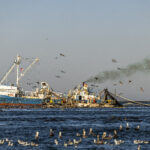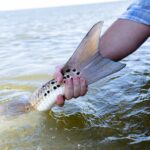
Gulf Menhaden Reduction Fishery: Bycatch Research & Useless Buffer Zones
Do you remember your driver’s test? How nervous were you when the instructor pulled out
Tony Friedrich
Policy Director ASGA
The ink isn’t dry on Amendment 7 and Addendum I was released last week. Addendum I could have been the document to correct the issues with Conservation Equivalency still existing, despite thousands of comments asking for guardrails. It should come as no surprise that Addendum I has nothing to do with conservation, rebuilding, or what the vast majority of the angling public wants. Instead, Addendum I is an attempt to maximize the COMMERCIAL HARVEST OF STRIPED BASS by allowing states to transfer unused commercial quota. During our conversations with commissioners, we were told there was “no appetite” for an addendum to correct the issues with CE since so much had gone on with striped bass management. You can imagine how we feel that Addendum I is already approved for public comment and is being fast tracked right in the middle of the holiday season. We think you might feel the same!
We never went after commercial fishing for striped bass. We focused on our sector. To initiate an addendum to fully exploit the commercial harvest of striped bass during a shaky at best rebuilding time is beyond comprehension.
Full disclosure, the Delaware commissioners have been pushing this for a while. The original plea was made in August of 2021. Delaware has a small quota for striped bass. To be honest, the Association would not have opposed a reasonable increase for the state. Delaware wanted this included in Amendment 7 but it was removed from the document. So, we are dealing with it now, it has changed, and will impact everyone. They even changed some state regulations to prepare for the increase in commercial quota. Here is a screenshot from that state meeting with a diagram showing the extended range of their new anchored gill nets.

I am sure Delaware feels like they have waited long enough. Maybe they have? But this effort has ballooned into something that has the potential to ramp up commercial harvest for multiple states. Is now really the time to consider maximizing commercial harvest? We must keep fishing mortality below f=.17 if there is any hope of rebuilding the stock by 2029. This isn’t the way to do it.
When you look at the amount of quota that goes unused in the ocean, you quickly understand that this could very easily add substantial commercial harvest on a yearly basis. This does not include the massive commercial harvest in the Chesapeake.

From 2017-2021, the ocean quota used approximately 65% of the 2.4 million pound quota. Maximizing this quota would add over half a million pounds to the commercial harvest and possibly even more. You can bet every state that already maximizes their commercial striped bass quota is going to line up to grab the transfers.
It should also be noted that the actual reductions of 25% and 18% in 2014 and 2019 respectively were applied to the quota and not the actual harvest. You can see the total commercial ocean harvest was similar to the 2018 harvest which was before the 18% reduction. Does it seem like the commercial sector is doing its part to rebuild the stock?
To make matters worse, at the meeting in November, Commissioner Armstrong from Massachusetts asked that the Technical Committee review the level of fishing mortality for the 2022 season at the May 2023 meeting to make sure we are staying on course for rebuilding. Thanks, Commissioner Armstrong, for your conservation ethos! There were some comments about staff time and constraints but it ultimately passed. There are eight hearings for this addendum. There were several other staff meetings to address these transfers. If the staff doesn’t have time to make sure we are staying on track to rebuild then they are spending their time doing the wrong things. This is what was said and we are going to hold your feet to the fire. Here is the timeline and amount of staff time dedicated to something very few people want. Please, tell us how we are taking this the wrong way?

This effort rips the bandaid off some issues we have been quiet on. First, we do not have a true slot limit when Massachusetts, North Carolina, Maryland, Delaware, Rhode Island, and Virginia can all commercially harvest fish over 35 inches in the Ocean. If anyone can harvest fish over 35”, we are not in a slot. Period…end of sentence. We are not protecting breeders because one sector can still harvest them.
The greater question is that jurisdictions like DC and NY have done exhaustive testing on the contaminates in striped bass. NY has a maximum commercial size of 38” based on science that says fish larger than that are loaded with PCB’s. NY is now conducting further testing on striped bass to include PFAS contamination. Those results should be shocking. DC has put a total consumption ban on eating any size striped bass. Correct me if I am wrong here but striped bass migrate, right? How do the fish in Massachusetts magically avoid PCB’s found in the Hudson and Potomac? These contaminates build up over time. Our bet is that a fish over 40” is probably not safe for anyone to eat. So, why is this still being done? Will we ever have a real slot limit?
Like most documents from ASMFC, the options in Addendum I are incredibly confusing. Luckily, our advocates only need to be familiar with one of the options this time.
Option A (status quo): Commercial quota transfers are not permitted.
Here is a link if you want to see the entire addendum.
More info on comments:
The final date comments will be accepted is January 13, 2023 at 11:59 p.m. (EST).
Email: comments@asmfc.org
Subject Line: Striped Bass Addendum I
Might as well bcc us in your comments. You will win something…. plus, we can track how many comments come in. Make sure to add a few sentences in the body of the email or it will be counted as a form letter.
Here is our email for comments: stripercomments@gmail.com
Below is the list of scheduled hearings. Most of these are hybrid so you can attend virtually. New York is in person only and the first on the calendar. We are trying to rally the troops to get as many bodies in the room as possible for that night.
Time to saddle up again. Spread the word near and far. Get everyone you know on these webinars. Send emails, call friends, and don’t give up. Fight and then get up tomorrow and fight some more.


Do you remember your driver’s test? How nervous were you when the instructor pulled out

If you’ve spent any time on the water in South Florida, chances are you’ve heard

Photo Credit: Graham Tayloe Big Win for Redfish in Alabama Huge news from the Marine

Feature Photo: Carter Abramson | Simms Fishing at the Fisheries Science Symposium We have more
We rely on our members and donations to keep fighting for a sustainable tomorrow in marine conservation.
GIVE THE GIFT OF FISHERIES CONSERVATION THIS HOLIDAY SEASON. SHOP ASGA GOODS THAT FUND FISHERIES RESEARCH & ADVOCACY CAMPAIGNS
JOIN ASGA IN CALLING FOR CRITICAL MANAGEMENT ACTION AFTER YEARS OF SPAWN FAILURES & POOR MANAGEMENT.
By using this website, you agree to our use of cookies. We use cookies to provide you with a great experience and to help our website run effectively. To learn more, please review our privacy policy.
10 Responses
Tony
Will the ASGA be providing a short list of bullet points that you feel should be incorporated into the Ammendment 1 comments we will be sending? I know form letters are taboo, but it would be helpful to have a few points you feel everyone should make. We can customize/personalize the wording to be sure it does not come across like a form letter.
Thanks
Hey Parker – major focus here is a single talking point on Option A!
“Option A (status quo): Commercial quota transfers are not permitted.”
That’s where we need to stand our ground.
Parker,
I will send you an email!
Hey guys,
Forgive me if Im missing this information but could you please tell me how I attend the meeting in Massachusetts on 12/19?
Thank you
Kyle
Hey Kyle,
Thanks for the question!
The Mass hearing is a webinar. You can register for it here. https://register.gotowebinar.com/rt/1832736777112760332
Hope this helps and we appreciate you speaking up for striped bass.
While I read about the effects of catch and release have on the bass stocks. There is no information about the 85,000 seals in Cape Cod on the bass summer grounds? How come? One 600 pound grey seal eats easily 50 lbs of fish a day. When will this problem be taken into account?
Why does it always seem like the recreational guy is getting the shaft? Is it just me thinking this? I may be misunderstanding the suggested amendment, it seems like at a time in which we should be reinforcing efforts to rebuild the stock of striped bass, a higher allotment will be allowed for some, but we are also adhering to the same limits for others. I realize it doesn’t have to be the same limit, but shouldn’t all involved parties be working towards the greater good? I know that I will follow whatever limits/laws are put in place, I just wish I understood the reasoning.